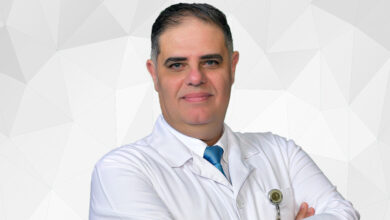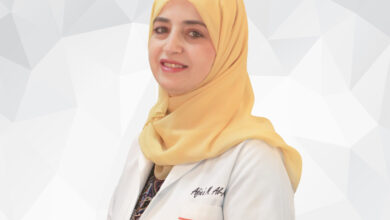Dr. Samer El-Ali
Medical Director, Gilead Sciences Eastern Europe and Middle East
Dr. Samer El-Ali
“HIV is now considered a chronic disease”

Dr. Samer El-Ali, Medical Director, Gilead Sciences Eastern Europe and Middle East, gave “Hospitals” magazine the below interview on the sidelines of the 2nd HIV Summit in the Middle East held in Dubai.
We would like to start by highlighting on the agenda of this summit? What are the main topics? How many attendees?
The 2nd HIV Summit in the Middle East, accredited by the Health Authority Abu Dhabi and supported by Gilead Sciences, has seen over 100 international and Middle East experts convene in Dubai on December 15 and 16, 2017. The Summit, entitled ‘Today’s Choices – Tomorrow’s Health’ discussed recent updates and developments in the field of Human Immunodeficiency Virus (HIV) in the region. For the second consecutive year, the Summit gathered leading infectious disease experts committed to the exchange of know-how and best practices focused on HIV management. The experts at the HIV Summit aimed to explore the challenges of linkage to care as a key factor in changing the HIV epidemiology and achieving the UNAIDS 90-90-90 goal particularly focusing on optimizing community testing and access to treatment as prerequisites for linkage to care.
Tell us about the recent figures on spreading of HIV in the world? Are they growing?
According to the latest data available from the Joint UN Program on HIV and AIDS (UNAIDS) an estimated 36.7 million [30.8 million–42.9 million] people globally are living with HIV. Even though new HIV infections have declined by 16% since 2010, 1.8 million [1.6 million–2.1 million] became newly infected with HIV in 2016. Today 1 in 3 people living with HIV still do not know their HIV status, so only 20.9 million [18.4 million–21.7 million] were accessing antiretroviral therapy in June 2017 and 1.0 million [830 000–1.2 million] people died from AIDS-related illnesses in 2016. In 2016, there were 230 000 [160 000–380 000] people living with HIV in the Middle East and North Africa, out of which an estimated 18 000 [11 000–39 000] were new HIV infections and an estimated 11 000 [7700–19 000] people died of AIDS-related illnesses. Between 2010 and 2016, the number of AIDS-related deaths in the region increased by 19%. When it comes to the treatment coverage, 24% [15–41%] among people living with HIV have been receiving treatment, of course, figures will vary from one country to the other. GCC countries – fortunately – are showing a low prevalence of HIV infections relatively to countries like Iran, Sudan & Morocco, however, the new infections rates are still a concern.
Is there an action strategy to raise awareness about this disease, in terms of the prevention or the mechanism of treatment and follow-up?
Gilead is actively involved in several medical community partnerships that focus on expanding screening programs, encouraging patients to take an active role in their treatment and linking them to prompt, appropriate medical care. It is crucial to educate both decision-makers and the population at large that the treatment and management of HIV have come a long way, with many of HIV patients now able to look forward to having a normal life expectancy. As such, HIV is now a chronic manageable condition.
Is there a development in the quality of tests that diagnose the disease?
The quality of tests that diagnose HIV was never in question. It is the accessibility of testing and stigma related to HIV that hinder the diagnosis. Many people who might have been exposed to HIV worry about doing the test because of the potential consequences they might face in their communities if tested positive. When we polled the Summit’s attendees and asked them what is the most difficult area in achieving 90-90-90, 43.2% responded – testing – confirming that all countries face the same issue, especially countries that have a low prevalence of HIV.
We would like you to talk about modern treatments that control HIV and limit its development?
Gilead is motivated by the urgent need to develop and deliver medicines that help save and improve lives, and for 30 years, Gilead has focused on the development of an antiretroviral therapy to treat HIV/AIDS, helping transform HIV infection from a fatal and debilitating disease into a chronic, manageable condition. In 2006, Gilead introduced the first single tablet regimen to treat HIV, transforming the treatment of the disease. Today we have five single tablet regimens available to patients and providers to help address the diverse needs of HIV patients worldwide. Advances in treatment over the last 30 years mean that HIV is now considered a chronic condition and people living with HIV can expect to live almost as long as the general population.
To what extent is managing HIV treatment important to achieve the desired results? How can this be done?
Many barriers remain to further expanding HIV treatment, although momentum is on the side of progress. There is now clear evidence that treatment scale-up can help turn the tide of the epidemic, and that treating more people can help reduce AIDS deaths and prevent new HIV infections. Achieving the goal of universal access to HIV treatment is within reach, and has never been more important.
















